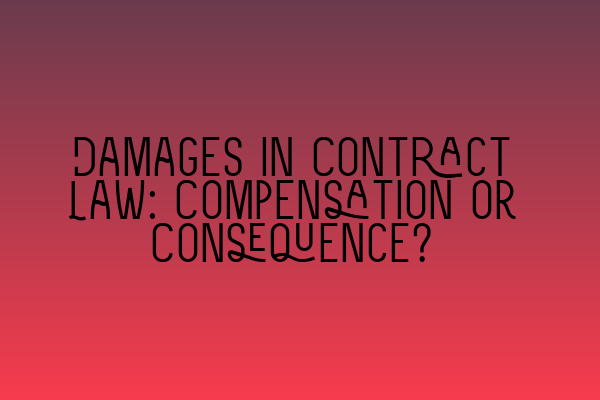Damages in Contract Law: Compensation or Consequence?
Contracts are an essential part of everyday life, governing the agreements between individuals, businesses, and organizations. When a breach of contract occurs, one of the remedies available to the injured party is the award of damages. Damages are intended to compensate the injured party for the loss suffered as a result of the breach.
Understanding Damages in Contract Law
In contract law, damages refer to the monetary compensation awarded to a party who has suffered a loss due to the other party’s failure to fulfill their contractual obligations. The objective is to put the injured party in the position they would have been in if the contract had been performed as agreed.
There are different types of damages that may be awarded in contract law, depending on the circumstances of the case:
- Compensatory Damages: These are the most common type of damages awarded in contract disputes. Compensatory damages aim to compensate the injured party for the actual loss suffered, such as financial losses, physical damages, or emotional distress. The amount awarded is based on the principle of providing a fair and reasonable compensation.
- Consequential Damages: Consequential damages are awarded when the non-breaching party suffers additional losses that were not directly caused by the breach of contract but were reasonably foreseeable. For example, if a business fails to deliver goods on time, resulting in the buyer losing a major deal, the consequential damages may include the lost profits from that deal.
- Liquidated Damages: In some contracts, the parties agree in advance on a specific amount of damages that will be payable in case of a breach. These are known as liquidated damages. While the purpose is to provide certainty and avoid lengthy litigation over damages, liquidated damages clauses must be reasonable and proportionate to the potential loss. Courts may refuse to enforce these clauses if they are found to be penalties rather than genuine pre-estimations of loss.
- Nominal Damages: Nominal damages are symbolic awards given when there is a technical breach of contract, but no actual loss has been suffered. These are generally token amounts, often as low as £1, awarded to acknowledge that the breaching party failed to fulfill their contractual obligations.
- Punitive Damages: Unlike compensatory damages, punitive damages are not typically awarded in contract disputes. They are more commonly associated with tort law. Punitive damages aim to punish the breaching party for their misconduct and deter others from engaging in similar behavior.
The Purpose of Damages: Compensation or Consequence?
The primary purpose of damages in contract law is to compensate the injured party for their actual loss. However, the concept of damages also serves other important functions:
Deterrence: By imposing financial liability on the breaching party, damages can discourage others from breaching contracts. The fear of paying substantial sums of money can act as a deterrent and promote compliance with contractual obligations.
Restitution: In some cases, damages can be used to restore the injured party to their original position before the breach occurred. For example, if one party received payment but failed to deliver the goods or services, the damages awarded may include returning the payment to the injured party.
Correction of Power Imbalances: Damages can help balance the scales when there is a significant power disparity between the contracting parties. It ensures that the party at a disadvantage is not left without redress, providing a level of protection in unequal bargaining situations.
Preservation of Contractual Expectations: By awarding damages, the court reinforces the principle that contracts should be honored and that parties must bear the consequences of their breach. This helps maintain trust and confidence in the contractual framework.
It is essential to note that the assessment of damages involves complex legal and factual considerations. The injured party must prove that the losses claimed are directly caused by the breach and are not too remote or speculative. They also have a duty to mitigate their losses by taking reasonable steps to minimize the impact.
The Role of Legal Professionals
When faced with a breach of contract, it is crucial to consult with a qualified solicitor who specializes in contract law. By seeking legal advice, you can ensure that the appropriate type of damages is claimed, and the amount sought reasonably reflects the loss suffered. An experienced solicitor can navigate the complex legal principles and gather the necessary evidence to support the case.
If you found this article helpful, you might be interested in exploring these related articles:
- Exploring the Impact of Frustration on Contractual Obligations: Legal Insights
- Interpreting Contractual Clauses: Unlocking the Hidden Meanings
- Legal Aspects of Business Contracts: Key Considerations for Entrepreneurs
- SQE Contract Law vs. Traditional Qualifications: A Comparative Analysis
- Agreements in Contract Law: Understanding Its Various Types
Remember, seeking legal advice tailored to your specific situation is essential, as contract law can be highly complex and fact-specific. By understanding the principles of damages in contract law, you can better protect your contractual rights and interests.
